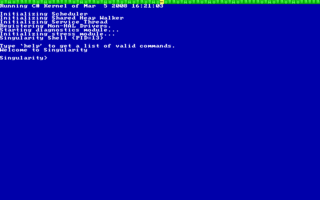Eiffel is an object-oriented programming language designed by Bertrand Meyer and Eiffel Software. Meyer conceived the language in 1985 with the goal of increasing the reliability of commercial software development; the first version becoming available in 1986. In 2005, Eiffel became an ISO-standardized language.

Design by contract (DbC), also known as contract programming, programming by contract and design-by-contract programming, is an approach for designing software.
In computer programming, a precondition is a condition or predicate that must always be true just prior to the execution of some section of code or before an operation in a formal specification.
In computer programming, a postcondition is a condition or predicate that must always be true just after the execution of some section of code or after an operation in a formal specification. Postconditions are sometimes tested using assertions within the code itself. Often, postconditions are simply included in the documentation of the affected section of code.
In computer programming, specifically when using the imperative programming paradigm, an assertion is a predicate connected to a point in the program, that always should evaluate to true at that point in code execution. Assertions can help a programmer read the code, help a compiler compile it, or help the program detect its own defects.
In computer programming, specifically object-oriented programming, a class invariant is an invariant used for constraining objects of a class. Methods of the class should preserve the invariant. The class invariant constrains the state stored in the object.
In class-based object-oriented programming, a constructor is a special type of subroutine called to create an object. It prepares the new object for use, often accepting arguments that the constructor uses to set required member variables.
In computer programming, an entry point is where the first instructions of a program are executed, and where the program has access to command line arguments.

Singularity is an experimental operating system (OS) which was built by Microsoft Research between 2003 and 2010. It was designed as a high dependability OS in which the kernel, device drivers, and application software were all written in managed code. Internal security uses type safety instead of hardware memory protection.

C# is a general-purpose, multi-paradigm programming language encompassing static typing, strong typing, lexically scoped, imperative, declarative, functional, generic, object-oriented (class-based), and component-oriented programming disciplines.
The Java Modeling Language (JML) is a specification language for Java programs, using Hoare style pre- and postconditions and invariants, that follows the design by contract paradigm. Specifications are written as Java annotation comments to the source files, which hence can be compiled with any Java compiler.

EiffelStudio is a development environment for the Eiffel programming language developed and distributed by Eiffel Software.
In object-oriented computer programming, an extension method is a method added to an object after the original object was compiled. The modified object is often a class, a prototype or a type. Extension methods are features of some object-oriented programming languages. There is no syntactic difference between calling an extension method and calling a method declared in the type definition.
In object-oriented computer programming, a null object is an object with no referenced value or with defined neutral ("null") behavior. The null object design pattern describes the uses of such objects and their behavior. It was first published in the Pattern Languages of Program Design book series.
This article describes the syntax of the C# programming language. The features described are compatible with .NET Framework and Mono.
The ANSI/ISO C Specification Language (ACSL) is a specification language for C programs, using Hoare style pre- and postconditions and invariants, that follows the design by contract paradigm. Specifications are written as C annotation comments to the C program, which hence can be compiled with any C compiler.
Extended static checking (ESC) is a collective name in computer science for a range of techniques for statically checking the correctness of various program constraints. ESC can be thought of as an extended form of type checking. As with type checking, ESC is performed automatically at compile time. This distinguishes it from more general approaches to the formal verification of software, which typically rely on human-generated proofs. Furthermore, it promotes practicality over soundness, in that it aims to dramatically reduce the number of false positives at the cost of introducing some false negatives. ESC can identify a range of errors which are currently outside the scope of a type checker, including division by zero, array out of bounds, integer overflow and null dereferences.
Kotlin is a cross-platform, statically typed, general-purpose programming language with type inference. Kotlin is designed to interoperate fully with Java, and the JVM version of Kotlin's standard library depends on the Java Class Library, but type inference allows its syntax to be more concise. Kotlin mainly targets the JVM, but also compiles to JavaScript or native code ; e.g., for native iOS apps sharing business logic with Android apps. Language development costs are borne by JetBrains, while the Kotlin Foundation protects the Kotlin trademark.
Whiley is an experimental programming language that combines features from the functional and imperative paradigms, and supports formal specification through function preconditions, postconditions and loop invariants. The language uses flow-sensitive typing also known as "flow typing."
Dafny is an imperative compiled language that targets C# and supports formal specification through preconditions, postconditions, loop invariants and loop variants. The language combines ideas primarily from the functional and imperative paradigms, and includes limited support for object-oriented programming. Features include generic classes, dynamic allocation, inductive datatypes and a variation of separation logic known as implicit dynamic frames for reasoning about side effects. Dafny was created by Rustan Leino at Microsoft Research after his previous work on developing ESC/Modula-3, ESC/Java, and Spec#. Dafny is been used widely in teaching and features regularly in software verification competitions.



